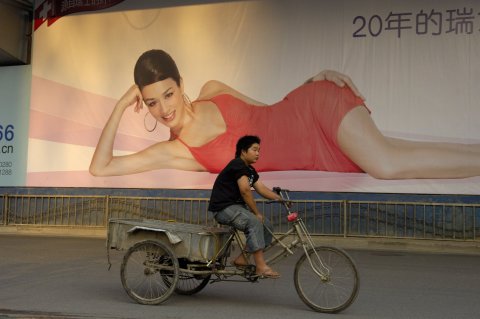Zhang Wei, a 29-year-old male resident of Beijing, is at first glance an unlikely exemplar for the power of women in modern China. But hear him out. A junior executive at a state-owned energy company, Zhang has not yet been able to save enough money to afford a decent apartment in Beijing, where prices have pretty much gone straight up since he entered the workforce seven years ago. So Zhang says he saves nearly 30 percent of his salary every month and is hoping prices decline a bit so he can buy in the next year or two. "I am," he concedes, "a little bit crazed by the idea."
Why would a young professional male be obsessed with buying an apartment in a market a lot of people think is already overpriced? "Because," he says, "I'd like to get married and start a family. My parents are really pressuring me. And if I don't own an apartment, that's really hard.''
Cut to a fashionable restaurant in Shanghai, where four women—friends from college, also young professionals—are having a drink after work. They could be cast in the Chinese version of Sex and the City: All are single and in their late 20s or early 30s. Tell them the tale of the thrifty Zhang, and they all smile. "I wouldn't even go out with a guy who didn't own a house, never mind marry him," says Hua Feng, triggering laughter from her friends, who then debate the pros and cons of Zhang, even though they've never met him.

Is the fact that he works for a state-owned company a plus or a minus? "It means he's more stable, his company won't go out of business, he'll always have a job," says Hua. "That's good.''
"Yes," chimes in Li Junling, an advertising executive, "but he'll never make a lot of money either. Who knows? Maybe he'll never have enough to buy a nice apartment.''
But when will they get married? After all, by traditional Chinese standards, they are running out of time. Aren't their grandchild-desiring parents putting heat on them?
"I feel like when it comes to [marriage] there's no real rush," says Li. "I don't really feel pressure. I think time is on my side actually." Her friends nod in agreement.
Related: China Abandons One-Child Policy, Allowing Couples to Have Two Children
Li is right. The reason young urban women in China these days are putting off marriage—working longer than they might have in the past, and earning more—is because they can. The simple fact is that they—not their male counterparts, like poor old Zhang in Beijing—are in the demographic driver's seat in China, and they will be for years to come. For a generation now, the number of boys being born in China has greatly outstripped the number of girls. This gender imbalance reached a peak of 1.22 to 1 in 2008, and is now about 1.16 to 1. By 2020, the National State Population and Family Planning Commission projects that males of marrying age will outnumber females by at least 30 million.
Historically, China has been a patriarchal culture in which the subjugation of women is symbolized most cruelly by the phenomenon of bound feet, a practice that didn't disappear entirely until the early 20th century. And it remains a male-dominated society today, never mind that ever since the ruling Communist Party came to power in 1949 it has trumpeted a phrase attributed to Mao Zedong: "Women hold up half the sky." Indeed, the demographic imbalance between men and women speaks to just how male-dominated it remains. The combination of China's one child policy and the advent of sonograms has meant that families who preferred a son could get what they wanted, aborting unwanted girls. The gender imbalance is a function of what Lauren Johnston, a Ph.D. student at Peking University writing a book on the subject, calls "the familial race to have an heir," greatly intensified by the one-child policy, which has been in effect since 1980.
With that backdrop, the recent progress of women within China is significant. Ever since 1995, when it hosted a high-profile United Nations conference on women's rights (attended by then–first lady Hillary Clinton) the government in Beijing has paid increasing attention to—and made some progress on—core feminist issues: access to jobs and higher education; stricter laws (and enforcement thereof) against domestic violence and sexual harassment; and more equitable divorce laws.
That there is still a long way to go is undeniable. The April arrest of five feminist activists for trying to raise awareness of sexual harassment in the workplace triggered a storm of criticism on Chinese social media—and was an abject embarrassment for a central government that this fall is scheduled to co-host with the U.N. a global women's summit. Too much of the all-male leadership at the very top of the Beijing government "have not an iota of an idea about the women's rights movement," says Wang Zheng, a longtime feminist activist in China and a professor at the University of Michigan.
But the demographic reality of modern China—that the number of boys so greatly outnumbers the girls—has far-reaching effects. And one of them—in the social sphere, in the everyday interaction between the sexes—is empowering women. In Chinese cities, the evidence of that is pretty much everywhere.

Consider Cai Li (who asked her real name not be used in this article), a 34-year-old marketing executive in Shanghai: She is smart, engaging, hip and attractive. She is also the divorced mother of an 8-year-old girl. When she caught her husband, a Taiwanese businessman, philandering five years ago, she didn't hesitate. "I divorced him as soon as I could," she says. "He was shocked. He thought I wasn't serious, that I wouldn't do it because of our daughter. I said, 'You'll see.' And within a week I had filed the papers [for divorce]. And why wouldn't I? Why should I put up with that? I have parents here in Shanghai who help take care of my daughter. I had a good job. Plus, if I want to get remarried, it's not as if there's a shortage of men, even at my age, who would be interested. [My ex] was crazy to think I was going to stick around.''
The only problem for Cai was that her parents sided with her ex. "They had a typical Chinese reaction. They said, 'Oh come on, he probably won't do it again. It's not that big a deal anyway,'" she says. "It was a generational attitude. When they were young, people put up with it, I guess. But I told them, not now. I was really angry. I put my foot down.… Things are different now."
Indeed, even government officials acknowledge that the demographic chasm in China is playing a role in the steadily increasing rate of divorce—a trend especially evident in big cities like Shanghai. Nationwide, the divorce rate rose from just over 1 percent of couples in 2003 to 2.57 percent in 2013, the last year for which complete data is available. Though that is still very low by international standards, the divorce rate in urban areas, where women are far likelier to be able to support themselves, is much higher. Recent research suggests that divorce rates in Beijing and Shanghai are now over 30 percent.
The number of divorces is "going to continue to go up for the foreseeable future," says Liu Xia, a former official in China's Family Planning Commission, "partly because women now have more choices, economically and demographically."
Young Chinese women are also playing harder to get in the marriage market. Li Junling and her three single friends in Shanghai are not outliers. Chinese women are getting married later and later. Nationwide, the average age is now 27.4, up from 26.4 in 2007. And in Shanghai last year, for the first time ever, the average age for young women to get married was over 30.

While that data would seem mainly to be a problem for 20- and 30-somethings (like Zhang), government officials know the demographic imbalance has "serious and far-reaching consequences," as Beijing's Family Planning Commission Minister Li Bin put it last year. Researchers and law enforcement agencies believe the gender imbalance has led to increases in sex-trafficking and prostitution. It, for example, propelled an active illicit business in forcing women refugees from North Korea into arranged marriages to older, single peasant men in northeastern China.
Some prominent researchers have begun to wonder whether the gender imbalance, and the effect it has on the marriage market in China, has a bearing on some of China's more pressing economic issues. They wonder if the behavior of a gentleman like Zhang—desperately saving all he can so he can buy an apartment and thus impress a prospective bride—might have something to do with China's stubbornly high household savings rate.
Wei Shang-Jin,, a former professor at Columbia University, is now the chief economist at the Asian Development Bank. In 2009, he and co-author Xiaobo Zhang, in the paper, "The Competitive Saving Motive," put forth a radical hypothesis as to why China's savings rate was so high, and why it wasn't coming down (as many economists have predicted it would). The high savings rate is hugely consequential. As Shang-Jin notes, China's household savings rate affects everything from international capital flows, to its massive trade imbalance, to U.S. exports and therefore employment. Put simply, if Chinese consumers spent more and saved less, Beijing's trading partners, the U.S. included, would sell more goods and services to them.
The standard economic story is that average Chinese save because of the absence of a solid social safety net, in particular a nationwide pension and health insurance system like Social Security and Medicare in the U.S. Wei is skeptical. He notes that in the past decade there has been significant improvement in both the national pension and health care systems. So he looked at data across several Chinese provinces that tried to correlate savings with gender imbalance. The results were striking. "We found that not only did households with sons save more than households with daughters on average, but that households with sons tend to raise their savings rate if they also happen to live in a region with a more skewed gender ratio," Wei says.
The effect of that, he says, was even more pronounced than he expected. "Even those not competing in the marriage market must compete to buy housing, and make other significant purchases, thus pushing up the savings rate for all households.'' To him the conclusion is inescapable. "None of the discussion about global imbalances has brought family-planning policy or women's rights to the table, because many do not see these issues as related to economic policy. Our research suggests that this is a serious omission.''
That the pursuit of marriage-aged women is so intense that it might move the needle on nationwide savings rates speaks to the power of the demographic imbalance. And it also speaks to the increasing personal power that lies in the hands of young, unmarried women. In the "marriage market,'' as Wei calls it, "when a young woman says jump, the young man best ask, how high?''
There is tremendous irony in that. China's gender imbalance is a moral scandal, a fact at least implicitly acknowledged by the Family Planning Commission in Beijing, which has set a goal of reducing it by the end of this year. That young women increasingly get to call the shots when it comes to love and marriage (and divorce) is one of the by-products of the imbalance. Guys like Zhang Wei may not like it. But they'd better get used to it.




















